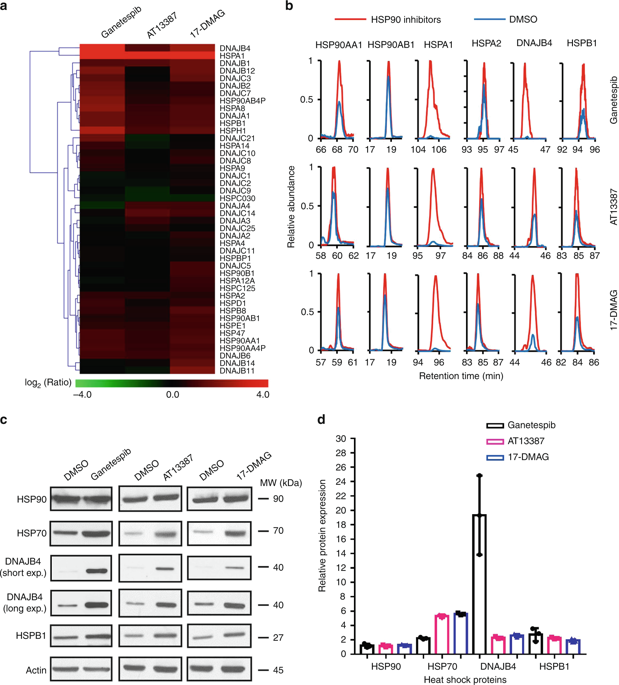当前位置:
X-MOL 学术
›
Nat. Commun.
›
论文详情
Our official English website, www.x-mol.net, welcomes your
feedback! (Note: you will need to create a separate account there.)
HSP90 inhibitors stimulate DNAJB4 protein expression through a mechanism involving N6-methyladenosine.
Nature Communications ( IF 14.7 ) Pub Date : 2019-08-09 , DOI: 10.1038/s41467-019-11552-8 Weili Miao 1 , Lin Li 1 , Yonghui Zhao 2, 3 , Xiaoxia Dai 1 , Xuemei Chen 2 , Yinsheng Wang 1
Nature Communications ( IF 14.7 ) Pub Date : 2019-08-09 , DOI: 10.1038/s41467-019-11552-8 Weili Miao 1 , Lin Li 1 , Yonghui Zhao 2, 3 , Xiaoxia Dai 1 , Xuemei Chen 2 , Yinsheng Wang 1
Affiliation

|
Small-molecule inhibitors for the 90-kDa heat shock protein (HSP90) have been extensively exploited in preclinical studies for the therapeutic interventions of human diseases accompanied with proteotoxic stress. By using an unbiased quantitative proteomic method, we uncover that treatment with three HSP90 inhibitors results in elevated expression of a large number of heat shock proteins. We also demonstrate that the HSP90 inhibitor-mediated increase in expression of DNAJB4 protein occurs partly through an epitranscriptomic mechanism, and is substantially modulated by the writer, eraser, and reader proteins of N6-methyladenosine (m6A). Furthermore, exposure to ganetespib leads to elevated modification levels at m6A motif sites in the 5'-UTR of DNAJB4 mRNA, and the methylation at adenosine 114 site in the 5'-UTR promotes the translation of the reporter gene mRNA. This m6A-mediated mechanism is also at play upon heat shock treatment. Cumulatively, we unveil that HSP90 inhibitors stimulate the translation of DNAJB4 through an epitranscriptomic mechanism.
中文翻译:

HSP90 抑制剂通过涉及 N6-甲基腺苷的机制刺激 DNAJB4 蛋白表达。
90 kDa 热休克蛋白 (HSP90) 的小分子抑制剂已被广泛用于临床前研究,用于治疗伴有蛋白毒性应激的人类疾病。通过使用无偏见的定量蛋白质组学方法,我们发现用三种 HSP90 抑制剂治疗会导致大量热休克蛋白的表达升高。我们还证明,HSP90 抑制剂介导的 DNAJB4 蛋白表达增加部分通过表观转录组学机制发生,并且主要受 N6-甲基腺苷 (m6A) 的写入蛋白、擦除蛋白和读取蛋白调节。此外,暴露于 ganetespib 导致 DNAJB4 mRNA 5'-UTR 中 m6A 基序位点的修饰水平升高,以及 5' 中腺苷 114 位点的甲基化 -UTR 促进报告基因 mRNA 的翻译。这种 m6A 介导的机制也在热休克治疗中起作用。累积起来,我们揭示了 HSP90 抑制剂通过表观转录组学机制刺激 DNAJB4 的翻译。
更新日期:2019-08-09
中文翻译:

HSP90 抑制剂通过涉及 N6-甲基腺苷的机制刺激 DNAJB4 蛋白表达。
90 kDa 热休克蛋白 (HSP90) 的小分子抑制剂已被广泛用于临床前研究,用于治疗伴有蛋白毒性应激的人类疾病。通过使用无偏见的定量蛋白质组学方法,我们发现用三种 HSP90 抑制剂治疗会导致大量热休克蛋白的表达升高。我们还证明,HSP90 抑制剂介导的 DNAJB4 蛋白表达增加部分通过表观转录组学机制发生,并且主要受 N6-甲基腺苷 (m6A) 的写入蛋白、擦除蛋白和读取蛋白调节。此外,暴露于 ganetespib 导致 DNAJB4 mRNA 5'-UTR 中 m6A 基序位点的修饰水平升高,以及 5' 中腺苷 114 位点的甲基化 -UTR 促进报告基因 mRNA 的翻译。这种 m6A 介导的机制也在热休克治疗中起作用。累积起来,我们揭示了 HSP90 抑制剂通过表观转录组学机制刺激 DNAJB4 的翻译。































 京公网安备 11010802027423号
京公网安备 11010802027423号